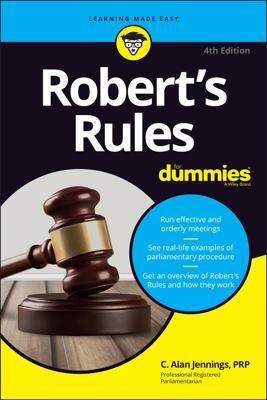According to Robert’s Rules, ordinary committees are regular committees that you establish either in your bylaws or as needed to consider various items of business and operational matters outside the organization’s regular meetings.
The term ordinary distinguishes the two usual types of committees from the committee of the whole and the quasi-committee of the whole. These nonordinary committees are created when an entire assembly decides to relax its rules to consider some item of business; the assembly changes itself into a committee of all the members of the organization who are present.
Standing committees
Usually standing committees are established in your bylaws to serve a permanent and continuing function for the organization. Your membership can create additional standing committees if authorized by the bylaws. Consider some of the more common examples of standing committees:
Nominating committee: This committee is generally established to recommend candidates for the offices of the organization. Members of this committee generally are elected by the membership, and the president must not be an ex officio member.
Auditing committee: Even an organization with limited funds should appoint members to review the treasurer’s financial records for accuracy, with an eye on whether the funds are disbursed as the members authorize. This committee, often appointed by the chair or the executive board, generally reports at the annual meeting. The treasurer must not be a member of this committee because the committee reviews the treasurer’s records.
Membership committee: Although not as common as the committees earlier in this list, many organizations provide for a committee to consider and recommend on membership recruitment and retention, or even on the admission of prospective members. The chair or the executive board commonly appoints this committee.
Finance and budget committee: The necessity of this committee depends on the needs of the organization, but a finance and budget committee does what its name suggests. This committee is expected to consider the financial resources and obligations of the organization, establish a budget, and recommend on financial matters for the benefit of the executive board and the membership.
The list of an organization’s standing committees depends largely on the group and its needs. Neighborhood associations may have standing committees on beautification, security, zoning, and deed restriction enforcement; professional associations may have a legislative affairs committee. The variations are endless.
Whenever an organization faces a continuing need to focus on some particular subject matter, the membership can benefit from establishing a standing committee to deal with that issue.
Special committees
Special committees are formed by motion and vote anytime your group needs to delegate a task or carry out some function not covered by the existing standing committees. These special committees exist only as long as it takes for them to complete their work and report back to the members.
Special committees exist only as long as it takes the committee to do its work and make its report. But that doesn’t mean they go on forever if they never report! When, for whatever reason, special committees wind up accomplishing about as much as standing water, you can count on Robert’s Rules for a few hints on how to make them evaporate.
A special committee ceases to exist in these cases:
When it completes its assigned task and makes its final report.
When it completes its assigned task, even if it doesn’t make a report.
When it is given walking papers from the assembly that created it.
When the term of the body (like the board or the convention) that created it ends. An exception arises if the committee was created to report to a future such body (like next year’s board or convention). If it doesn’t do its job and give its report by the time the next board’s term ends (or the next convention adjourns), it’s a gone goose, for sure.

